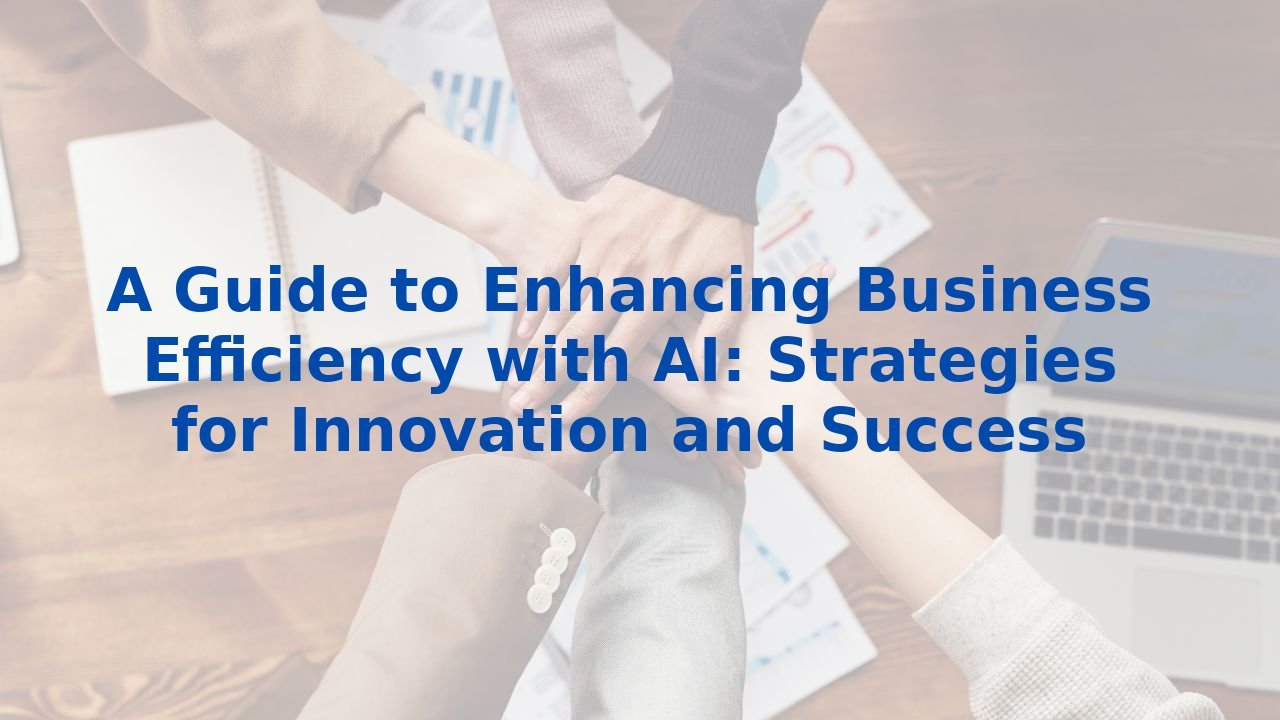A Guide to Enhancing Business Efficiency with AI: Strategies for Innovation and Success
Enhancing Business Processes with AI: A Guide to Efficiency and Innovation
In today's fast-paced business environment, organizations are constantly seeking ways to optimize their operations and stay ahead of the competition. One powerful tool that has emerged as a game-changer in this quest is Artificial Intelligence (AI). By leveraging AI, businesses can streamline their processes, improve efficiency, and enhance overall performance. In this blog post, we will delve into the various ways AI can enhance business processes and explore the benefits of integrating AI into your organizational strategy.
1. Process Discovery: Unveiling Hidden Efficiencies
AI-driven process discovery is a critical phase in Business Process Management (BPM). It utilizes advanced technologies like process mining, pattern recognition, and natural language processing to uncover a company's existing processes. Unlike traditional methods that rely on employee interviews and manual data analysis, AI can quickly sift through vast amounts of operational data, identifying patterns and workflows that often go unnoticed by human eyes.
2. Process Mapping: Creating a Blueprint for Success
Following the discovery phase, AI process mapping translates insights into actionable blueprints. AI can visualize workflows using machine learning and data analytics, showing how processes interlink and where inefficiencies create bottlenecks. This helps keep process documentation current and provides a comprehensive overview of an organization's processes.
3. Process Automation: Reducing Manual Labor
AI-powered process automation is a significant step towards enhancing efficiency. By leveraging software bots, organizations can automate repetitive and rule-based workflows, significantly speeding up processes and reducing costs. This allows employees to focus on more demanding tasks, utilizing human resources more effectively.
4. Process Management: Continuous Monitoring and Improvement
Once detailed process maps are created, AI's role extends into the day-to-day execution and management of these processes. AI-powered monitoring tools can track key performance indicators (KPIs) and alert management of potential issues, utilizing historical data to drive continuous improvement.
5. Process Improvement: Data-Driven Insights
AI provides data-driven insights, predictive modeling, root cause analysis, and dynamic adaptability to drive sustainable improvements. By analyzing large and complex datasets, AI can identify weaknesses, redundancies, and bottlenecks in business processes, providing actionable recommendations for optimization.
Benefits of AI for Business Process Improvement
1. Faster Results and Better Decision-Making
AI leads to faster results and better decision-making by processing vast amounts of data quickly and accurately. This enables companies to respond promptly to changing market conditions and customer needs.
2. Higher Quality and Efficiency
AI enhances the quality and efficiency of business processes by automating routine tasks, reducing errors, and improving operational efficiency. This results in higher productivity and better customer satisfaction.
3. Real-Time Monitoring and Adaptability
AI allows for real-time monitoring of processes, enabling companies to intervene immediately if necessary. This adaptability is crucial in today's dynamic business environment, where quick responses are often the key to success.
The Importance of Training Employees for AI
While AI is a powerful tool, its full potential can only be realized when employees are adequately trained to work with it. Here are some key points to consider:
1. Understanding AI Capabilities
Employees need to understand how AI works and what it can do to effectively integrate it into their workflows. This includes knowing how to use AI tools and interpret the insights they provide.
2. Adapting to New Technologies
As AI continues to evolve, employees must be adaptable and willing to learn new technologies. This ensures that the organization remains competitive and can leverage the latest advancements in AI.
3. Enhancing Creativity and Problem-Solving Skills
Training employees in AI can also enhance their creativity and problem-solving skills. By understanding how AI works, employees can think more critically and come up with innovative solutions to complex problems.
Conclusion
In conclusion, AI is a transformative technology that can significantly enhance business processes, leading to improved efficiency, higher quality, and better decision-making. By leveraging AI for process discovery, mapping, automation, management, and improvement, organizations can streamline their operations and stay ahead in the competitive landscape. Additionally, training employees for AI is crucial to realizing its full potential and ensuring that the organization remains adaptable and innovative in the face of technological advancements. By embracing AI and investing in employee training, businesses can unlock new levels of efficiency and success.
To learn more about how to equip your entire workforce with AI skills, consider exploring resources on AI training programs.



